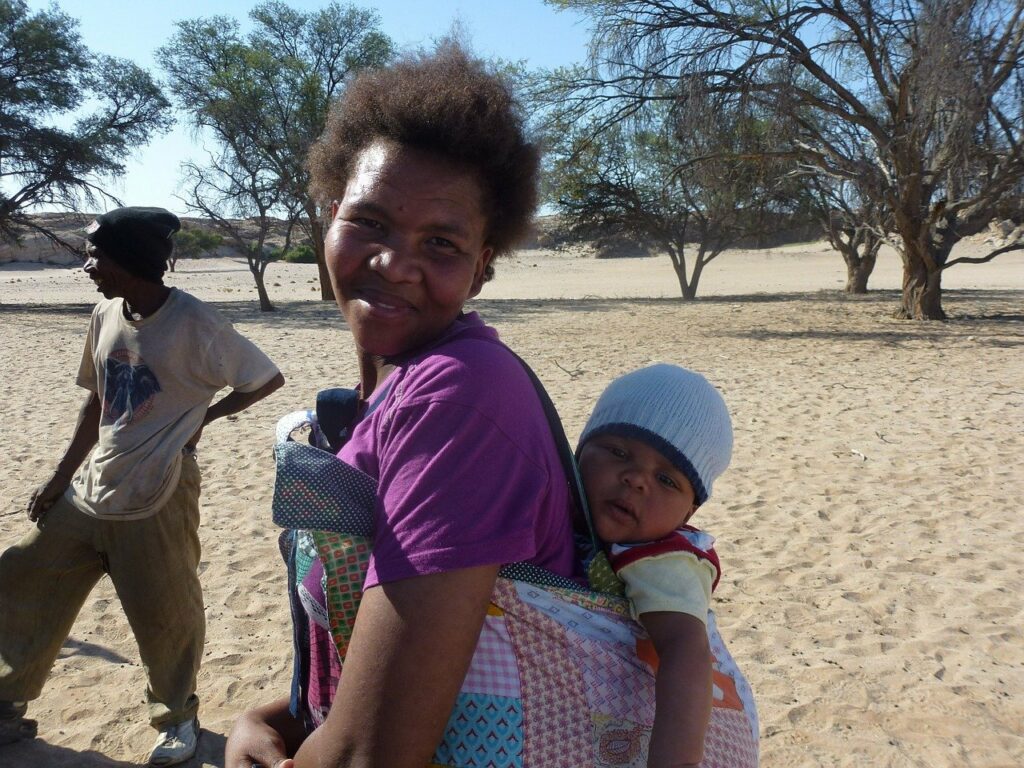The Republic of Namibia is a sparsely populated country in Southern Africa. With 2.7 million inhabitants, or 3.3 people per square kilometer, it ranks second in the world for lowest population density. Most of its surface is occupied by the Namib and Kalahari deserts.
The Namibian growth rate for the year 2020 is around 2%, just as it is for Congo, Senegal, Egypt; but also Saudi Arabia and Luxembourg. Of course, in those latter cases, the per capita income changes substantially.
It is among the youngest states of the African continent. It was a colony of the German empire with the name of Deutsch-Südwestafrika between 1884 and 1919, a part of the South African Union under the British Crown until 1961, and subsequently a province of the South African Republic until it obtained independence in 1990.
A legacy of the South African era is the law still in force that regulates access to abortion in Namibia. The Abortion and Sterilization Act 2 of 1975 (RSA) (repealed in South Africa in 1996) allows for the termination of pregnancy when there is a danger to the physical and/or mental health of the mother, a risk of serious and irreversible disability to the unborn child, or when the pregnancy is the result of rape or incest. That is more than enough; in fact, far too much.
Apparently this is not enough for pro-choicers. For example, in 2015–2016, HEARD, an applied research organization affiliated with the University of KwaZulu-Natal, South Africa, using the usual argument of the risks involved in “unsafe abortion”, spread studies and pamphlets complaining that “on-demand” abortion–considered a human right–was not readily available in the African country.
And apparently, this is not enough even today. At the end of October, the Namibian government held a consultation on the Abortion Act. It was urged on in the courtroom and on social media by Deputy Minister of Health and Social Services Esther Muinjangue, human rights lawyer and United Nations Special Advisor for Africa Bience Gawanas, and pro-choice activist groups such as SheDecides and Voices for Choices and Rights Coalition (VCRC).
During public hearings, Ministry of Health and Social Services executive director Ben Nangombe stated that the department “believes that current abortion legislation is outdated and needs to be revised, and new legislation enacted that incorporates and speaks to the realities on the ground.”
The issue is told in depth in an article by The Telegraph on 2 November, which also points out that “… amending the legislation could still be at least a year away. The national debate will be followed by regional public hearings on abortion, at the end of which a report will be drawn up and presented to parliament.” The author of the article seems sorry that the legislation didn’t go to hell right there and then.
In fact, The Telegraph seems to support the voices of those in the country who let themselves be applauded at length when, last month, Benin approved the legalization of abortion.
Above all, the British newspaper endorses the view of those who consider the current Namibian law to be a remnant of patriarchy, religion, and apartheid.
Yes, apartheid. According to correspondent Sarah Newey: “The Abortion and Sterilization Act of 1975, historians say, was introduced to prevent white women from terminating pregnancies, amid hysteria that the black population would outnumber them.”
It is evident that when approached–united, implicated and compromised with a tragic policy of racial segregation to the detriment of entire populations–a law… any law, is not only bad, but actually execrable. This, however, does not detract from the fact that it would be execrable to extend access to abortion–including elective abortion on demand. It not only fails to compensate those who have been true victims of apartheid, it would also violate an inalienable, untouchable, non-negotiable right; namely the right to life.
In The Telegraph article, Ndiilokelwa Nthengwe, co-founder of the self-styled pro-choice organization Voices for Choices and Rights Coalition, states, “slowly, we are decolonizing and removing the remnants of apartheid from our Constitution… to truly achieve a fair and just society for all Namibians. […] It means that, finally, we are addressing institutional laws that have for years been used to oppress women, teenage girls and gender non-conforming people.”
A “fair and just society” for all Namibians. For everyone, except babies in the womb. No justice or fairness for them.
